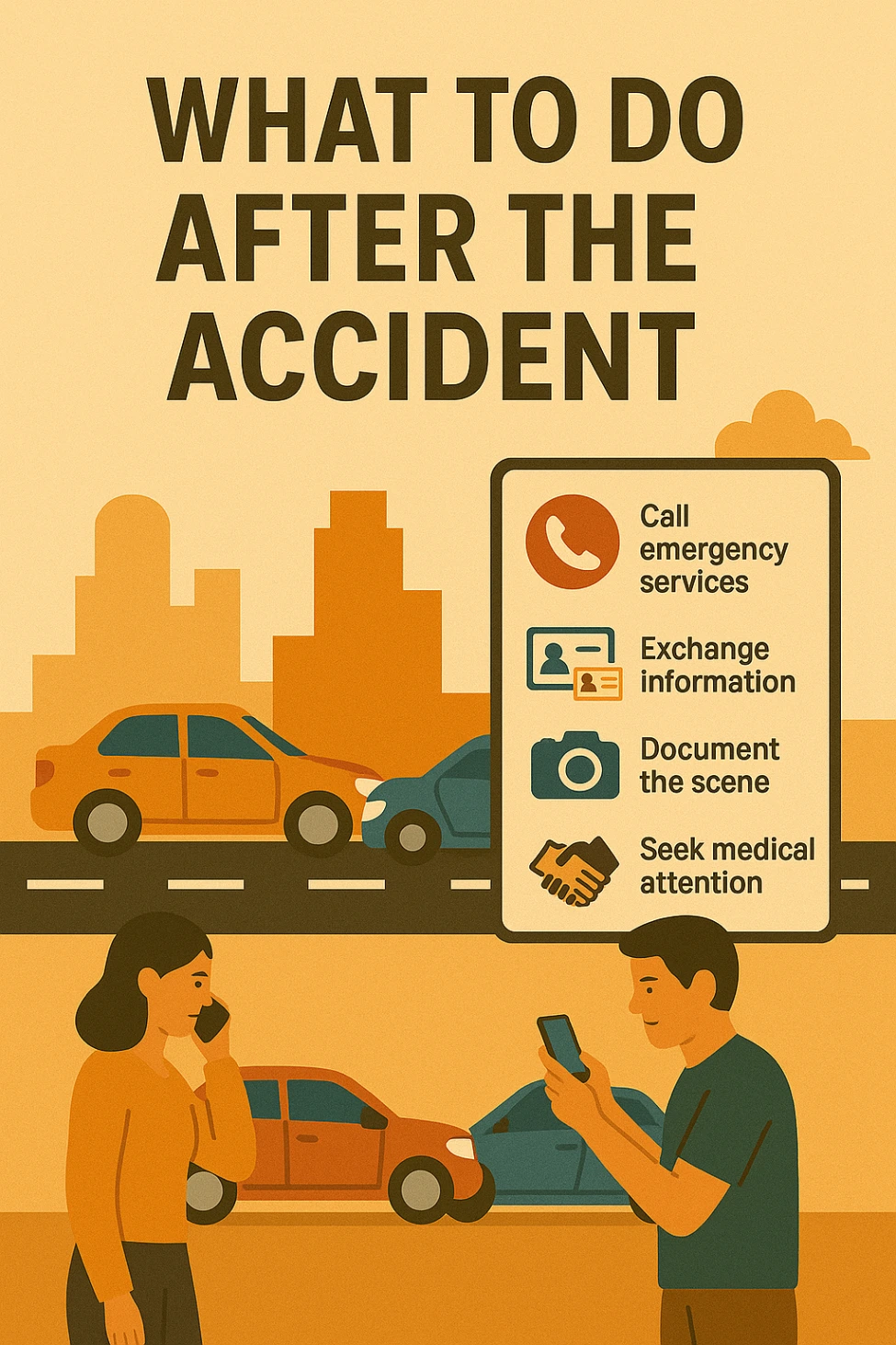Car accidents happen in seconds. But they can impact your life for months or even years. In Phoenix, busy roads like I-10 and I-17 cross with crowded streets. Extreme weather creates extra risks. Knowing what to do after a crash is key. This guide walks you through the steps to take after an accident in Phoenix. It helps you protect your health, legal rights, and money.
Right After a Phoenix Accident
Stay Safe First
- Move to a safe spot if you can, especially on Phoenix’s fast roads
- Turn on hazard lights to warn other drivers
- During summer, watch out for extreme heat – temps on Phoenix roads can top 160°F
- Set up warning triangles or flares if you have them, especially at night
Check for Injuries
- Look yourself and passengers over for injuries
- Call 911 right away if anyone is hurt, even if injuries seem small
- Stay still if you think you have neck or back injuries – Phoenix Fire medics know how to handle these safely
Call the Police
The Phoenix Police say to call police for any accident with:
- Injuries
- Death
- Property damage over $1,000
- Vehicles that need towing
- Drunk or impaired driving
- Hit-and-run cases
For minor accidents without injuries, Phoenix Police now wants drivers to file a report online through their Incident Reporting System.
Exchange Info
Get this info from all drivers:
- Full name and contact info
- Driver’s license number
- License plate number
- Insurance company name and policy number
- Vehicle make, model, and year
- Where the accident happened
Key Steps to Record the Scene
Take Photos and Videos
- Capture all vehicles from multiple angles
- Record visible injuries
- Photo road conditions, traffic signals, and signs
- Record weather conditions (especially during monsoon season)
- Take pictures of skid marks or debris
Find Witnesses
- Get names and contact info of witnesses
- Ask if they’ll provide a statement
- Note if nearby businesses might have security cameras that caught the accident
Recent Phoenix Accident Examples
Learning how others handled accidents can help you:
April 2025 – I-10 Multi-Vehicle Crash
The Arizona Republic reported a six-vehicle crash on I-10 near the 7th Street exit. It caused big delays during morning rush hour. The Arizona DPS said proper records by several drivers helped establish fault. This included dashcam footage. Drivers who moved their vehicles to the shoulder when possible helped prevent more accidents in the heavy traffic.
March 2025 – Monsoon Season Prep
ABC15 Arizona reported on proper post-accident steps during Phoenix’s monsoon season. Their story showed a case where drivers in a minor crash during a dust storm stayed in their vehicles with hazard lights on. They waited until help arrived. This may have prevented more serious injuries when visibility was very poor.
February 2025 – Pedestrian Incident
AZ Family covered a pedestrian accident near Central Avenue and Thomas Road. Bystanders provided critical help until emergency services arrived. The news story showed how witnesses who properly recorded the scene with smartphone photos and videos provided key evidence. This helped both the probe and the victim’s insurance claim.
Get Medical Care
Get Checked, Even for “Minor” Accidents
The Phoenix Car Accident Lawyers at GLG stress that many serious injuries may not show symptoms right away. This includes whiplash, concussions, and internal bleeding. Phoenix’s trauma centers can handle accident injuries of all levels. These include Banner Medical Center and Valleywise Health Medical Center.
Common Delayed Symptoms
Watch for these symptoms in the days after your accident:
- Headaches
- Neck or shoulder pain
- Back pain
- Numbness or tingling
- Stomach pain
- Changes in physical function
- Mental symptoms like anxiety or PTSD
Record All Medical Treatment
- Keep all medical records and bills
- Follow treatment advice exactly
- Track all medications
- Record how injuries affect daily tasks
Report the Accident
Tell Your Insurance Company
Contact your insurance provider as soon as you can after the accident. Arizona law requires you to report accidents to your insurer, even if you weren’t at fault.
File an Arizona Crash Report
The Arizona DOT requires a report for any accident with:
- Injuries or death
- Property damage over $1,000
- Certain work vehicles
You can get the Arizona Crash Report form from:
- The responding police officer
- Local police stations
- Arizona DOT website
- Arizona DPS offices
Get the Police Report
For accidents where police came, request a copy of the police report. It usually becomes ready 5-7 business days after the incident. You can request Phoenix Police reports:
- Online through the Phoenix Police Records Request System
- In person at Phoenix Police Headquarters (620 W. Washington Street)
- By mail with the proper form and fee
Arizona Insurance Facts
Fault Rules
Arizona is a “fault” or “tort” state. This means the driver who caused the accident is liable for damages. This differs from “no-fault” states where each driver’s insurance covers their own damages no matter who’s at fault.
Minimum Insurance Required
Arizona law requires all drivers to carry minimum liability insurance of:
- $25,000 bodily injury coverage per person
- $50,000 bodily injury coverage per accident
- $15,000 property damage coverage per accident
Shared Fault
Arizona follows a “pure shared fault” system. This means:
- You can recover damages even if you were partly at fault
- Your payout is reduced by your share of fault
- If you were 30% at fault, you can recover 70% of your damages
When to Call an Attorney
According to GLG’s Phoenix Personal Injury Center, you should consider calling an attorney if your accident involves:
- Major injuries needing medical treatment
- Long-term or permanent injuries
- Large medical expenses
- Lost wages or reduced earning power
- Disputes over fault or liability
- Insurance company tactics like denial of valid claims or lowball offers
- Complex cases with multiple parties or work vehicles
Dealing with Insurance Companies
Be Careful with Statements
- Stick to the facts when describing the accident
- Don’t guess about fault
- Never admit guilt
- Don’t downplay your injuries
- Don’t give recorded statements without legal help
Review Settlement Offers Carefully
GLG’s Accident Recovery Guide warns against accepting quick settlement offers. They rarely account for:
- Future medical expenses
- Long-term pain and suffering
- Ongoing rehab needs
- Future lost wages
- Reduced quality of life
Record All Talks
Keep detailed records of all talks with insurance companies:
- Names and positions of reps
- Dates and times of talks
- Summaries of what was discussed
- Copies of all letters and emails
- Claim numbers and contact info
Phoenix-Specific Issues
Heat-Related Concerns
Phoenix’s extreme temps create unique post-accident issues:
- During summer months (May-September), don’t wait in disabled vehicles without air
- Keep water in your vehicle for emergencies
- Be aware of increased risk of vehicle fires in extreme heat
- Record heat-related factors that may have caused the accident
Tourism Factors
As a major tourist spot, Phoenix sees many out-of-state drivers who may not know local roads. If your accident involves:
- Rental vehicles
- Out-of-state drivers
- Work tour vehicles
Extra records may apply.
Snow Bird Issues
During winter, Phoenix’s population swells with seasonal residents (“snowbirds”). This can create insurance issues if:
- The other driver has out-of-state insurance
- They claim primary residence elsewhere
- Multiple state laws might apply to the claim
Use Technology to Help
Modern technology provides valuable tools for post-accident records:
Smartphone Apps
Several free apps are designed for accident records. They can guide you through:
- Collecting needed info
- Taking proper photos
- Recording witness statements
- Mapping accident locations using GPS
Dashcams
Dashcam footage has become very important in Phoenix accident probes. If you have a dashcam:
- Secure the footage right away
- Make multiple backup copies
- Provide the unedited video to your insurance company and attorney
Traffic Cameras
Phoenix has many traffic cameras on major roads. After an accident:
- Note any visible traffic or security cameras
- Request footage through official channels quickly (often deleted after 30 days)
- Your attorney can help obtain this evidence through proper legal channels
Long-term Follow-up
Continue Medical Treatment
- Attend all follow-up visits
- Complete prescribed physical therapy or rehab
- Record any new or worsening symptoms
- Keep records of all medical expenses and treatments
Monitor Your Recovery
- Track how injuries affect daily tasks, work, and quality of life
- Note any mental impacts like anxiety or PTSD
- Record changes needed at home or work
- Keep a journal of pain levels and limits
Stay Organized
Create a dedicated file for all accident-related records:
- Medical records and bills
- Repair estimates and receipts
- Pay stubs showing lost wages
- Letters from insurance companies
- Photos and notes from the accident
- Contact info for all involved parties
Phoenix Resources for Accident Victims
Several local resources can provide help after an accident:
- Arizona DOT – For official crash reporting needs and forms
- Phoenix Police – For accident reports and probe info
- Maricopa County Attorney’s Office Victim Services – For victims of accidents with criminal behavior
- Arizona Department of Insurance – For help with insurance issues
Conclusion
The moments after a car accident in Phoenix can be chaotic and stressful. But taking the right steps can greatly impact your physical recovery, legal protection, and money. By following this complete guide, you’ll be better prepared to handle the complex aftermath of a crash on Phoenix roads.
Remember that every accident is unique. Specific cases may require extra steps. When in doubt, talk with qualified medical and legal professionals who understand Arizona’s specific laws and the particular challenges of Phoenix’s urban setting.



